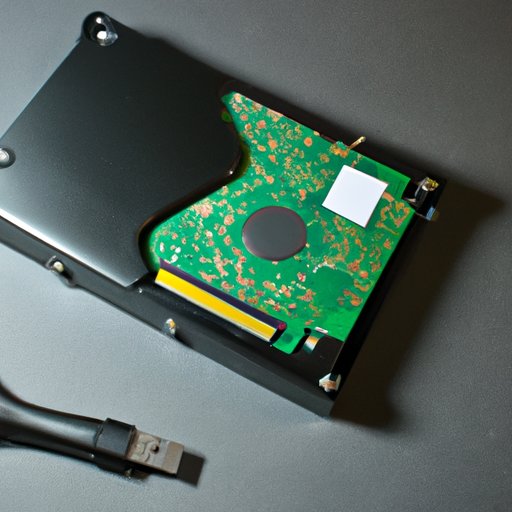Introduction
Regularly checking the health of your hard drive is crucial to ensure better system performance, data security and to avoid losing your data. A failing hard drive can cause countless problems, making it difficult or almost impossible to access your files, documents, and important data. In this article, we will explore how to check the health of a hard drive and different tools that can help you to recover data.
Warning Signs of a Faulty Hard Drive
Before looking for the tools to check your hard drive health, you need to know the warning signs indicating that your hard drive is failing or about to fail. These signs include:
- Unusual noises coming from your hard drive
- Frequent system crashes or Blue Screens of Death (BSODs)
- Slow system performance
- Error messages while accessing files or applications
- Corrupted files
- System freezing or hanging
- Increased bad sectors count
If you experience any of these signs, then it is crucial to check the health of your hard drive.
Software Tools to Check Hard Drive Health
Software-based tools are available to check the health of your hard drive and prevent loss of your valuable data. Some of the commonly used software tools include:
CrystalDiskInfo
CrystalDiskInfo is a free and user-friendly application that enables you to monitor your hard drive’s health. The app comes with several useful features that provide you full information about your hard drive’s condition. This tool includes real-time monitoring of your hard drive’s attributes, S.M.A.R.T. analysis, and disk temperature measurement, which helps to identify potential problems with the hard drive. Moreover, CrystalDiskInfo supports a wide range of storage devices, making it a flexible option for users.
Western Digital Data Lifeguard
Western Digital Data Lifeguard is a proprietary tool developed by Western Digital which offers comprehensive hard disk diagnostic tests on Western Digital hard drives. The software checks several aspects of the hard disk, including S.M.A.R.T. error detection, diagnostic scans, and provides an error log. This tool is user-friendly and helps users diagnose and detect issues with their hard drives.
Hard Disk Sentinel
Hard Disk Sentinel is a comprehensive program that runs diagnostics on hard drives to determine their health status. This tool can create detailed reports on the condition of hard drives and provide insights into disk performance. It comes with several features such as alerts, status updates, temperature monitoring, and advanced health estimations. Hard Disk Sentinel is a reliable tool that can detect potential problems and warn users before a hard drive failure.
Hardware Tools such as USB-to-SATA Adapters
Hardware tools like USB-to-SATA adapters are available and can help you recover data from hard drives that are failing. These tools allow you to mount your hard drive as an external drive and recover data quickly. There are different types of USB-to-SATA adapters in the market, and each has its specific features and functionalities.
Dual-Purpose USB-to-SATA Adapter
The Dual-Purpose USB-to-SATA Adapter is an excellent choice for computer technicians or hardware enthusiasts. This adapter is versatile and can work with both desktop and laptop hard disk drives. The adapter comes with various cables that fit different hard drive types, adapters, and a power supply. This tool is easy-to-use, and its dual functionality makes it a good value for money option for users.
USB-to-SATA Adapter with Integrated Data Recovery Software
Another type of USB-to-SATA adapter is one that comes with in-built data recovery software. This adapter is suitable for users who need a quick and simple way to recover data from their hard drives. The adapter has a USB interface that can be connected to any PC, and its built-in data recovery software allows data recovery without installing any additional software. Moreover, this adapter can clone your entire hard drive to another hard drive, which is a convenient way to ensure your data is safe and secure.
Data Backup and System Restoration
In addition to checking the health of your hard drive, it is paramount to have a proper data backup and system restoration plan to ensure the safety of your data. Regular backups of your essential data can protect you from any potential loss due to hard drive failure, system crashes, or other problems. There are different ways to make data backups, including external hard drives, flash drives, clouds, or network attached storage devices. Some operating systems like Windows come with built-in backup software that can be used to schedule backups.
Conclusion
Checking the health of your hard drive is critical to keeping your data secure and accessible. Software tools like CrystalDiskInfo, Western Digital Data Lifeguard, and Hard Disk Sentinel can help identify potential problems with your hard drive. Hardware tools like USB-to-SATA adapters can help recover data from a failing hard drive. In addition, regular data backups and system restoration plans can go a long way in ensuring that your essential data and files are not lost. We recommend checking your hard drive health regularly and making scheduled backups of your essential data.
(Note: Is this article not meeting your expectations? Do you have knowledge or insights to share? Unlock new opportunities and expand your reach by joining our authors team. Click Registration to join us and share your expertise with our readers.)
